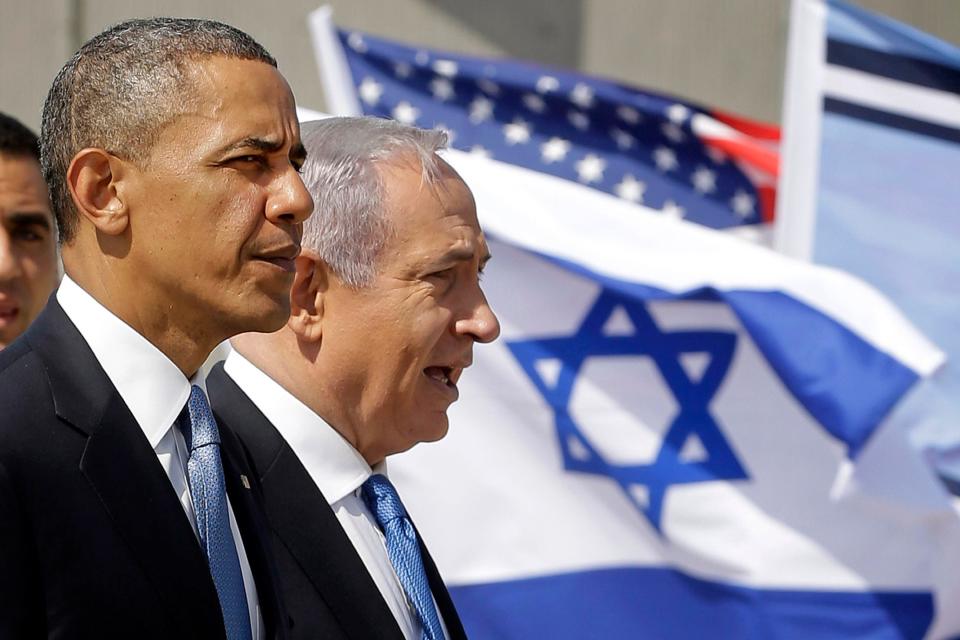US aid to Israel was always a given. Will growing support for Palestinians change that?
- Oops!Something went wrong.Please try again later.
WASHINGTON – Although the latest conflict between Israel and Hamas has ended, the heated debate in Washington over $3.8 billion in military assistance to Israel may be just beginning.
A shift in Congress, with progressive Democrats expressing concerns that U.S. taxpayer dollars are being used to violate Palestinians' rights, makes it likely that any future U.S. weapons sales to Israel will come under scrutiny.
“For decades, the U.S. has sold billions of dollars in weaponry to Israel without ever requiring them to respect basic Palestinian rights," Rep. Alexandria Ocasio-Cortez, D-N.Y., said last week after pushing to block a $735 million weapons sale to Israel. "In so doing, we have directly contributed to the death, displacement and disenfranchisement of millions.”
President Joe Biden has tried to tamp down the revolt in his own party.
"There is no shift in my commitment ... to the security of Israel. Period," Biden told reporters as the cease-fire took effect, ending Israel's 11-day conflict with Hamas, the militant Islamic group that controls Gaza. The fighting killed at least 248 Palestinians and 12 Israelis.
Aftermath: Casualty of Israeli-Hamas fighting: The Palestinian two-state solution?
Here are key facts about U.S. aid to Israel and why it has become a flashpoint:
Why does the US support Israel's military?
America's military aid to Israel is unique in at least three ways – scale, lack of transparency and long-term commitment, says Lauren Woods, who analyzes U.S. security assistance at the Center for International Policy, a Washington research organization.
The reason for America's outsize commitment to Israel's security is simple, supporters say: It is America's closest ally in the Middle East and the only democracy in the region.
But for the first 14 years of Israel's existence, the U.S. refused to provide any military assistance to Israel, said David Makovsky, a fellow at the Washington Institute for Near East Policy. That began to change in the Kennedy and Johnson administrations, and the U.S. dramatically ramped up military aid after Israel and Egypt signed a peace treaty in 1979.
Who's who: Key players in the Israel-Palestinian conflict
U.S. funding for Israel's military is now a cornerstone of American foreign policy, enjoying broad bipartisan support in Congress and the White House.
The aid "advances important U.S. national security interests in a highly challenging region," 329 House members wrote in a letter in April defending the fiscal year 2022 request for $3.8 billion in military assistance to Israel.
Biden and others note that Israel faces direct threats from its neighbors. Hamas, which the U.S. considers a terrorist group, rejects Israel's right to exist, as do Iran and Lebanon’s militant group Hezbollah.
"Israel's enemies and America's enemies have been very much the same," Makovsky said.
The Biden administration has pledged to provide about $250 million in economic and development assistance to the Palestinians and recently announced additional aid to help with recovery in Gaza, which bore the brunt of the destruction in the conflict.
Trump reversal: Biden to reopen US consulate in Jerusalem in a bid to repair ties with Palestinians
How much aid does the U.S. give Israel?
The United States has given Israel a total of $146 billion in bilateral assistance and missile defense funding through 2020, according to the Congressional Research Service (CRS), which provides nonpartisan research to lawmakers. That makes it the largest cumulative recipient of U.S. foreign aid since World War II. (Other top recipients include Egypt and Afghanistan.)
The U.S. makes 10-year security funding commitments to Israel, something it does not do for any other country, Woods says.
Under the current deal, the U.S. has agreed to give Israel about $3.8 billion in military assistance annually. The vast majority of that – $3.3 billion – flows through U.S. foreign military financing grants that Israel can use to purchase American-made weapons, services and training.
The U.S. gives Israel another $500 million each year specifically for missile defense under the agreement, which was signed in 2016 during the Obama administration. It covers fiscal year 2019 through 2028.
The deal gave Israel "unparalleled access to some of the most advanced military equipment in the world, including the F-35 Joint Strike Fighter," the Obama White House boasted in 2016.
Indeed, decades of such assistance has helped "transform Israel's armed forces into one of the most technologically sophisticated militaries in the world," the CRS report says. "U.S. military aid also has helped Israel build its domestic defense industry, which now ranks as one of the top global exporters of arms."
U.S. role: Biden has yet to reverse many of Trump's pro-Israel policies he labeled 'destructive'
UN officials, progressives cite human rights, war crimes
Ocasio-Cortez is part of a growing minority in Congress raising questions about whether American taxpayer money is being used to exacerbate Palestinian suffering and entrench Israel's occupation of Palestinian territory.
She and others say the U.S. should put conditions on the military assistance – such as freezing Israeli settlement expansion and ensuring Palestinians' basic human rights are respected.
“Our government is directly complicit in the human rights atrocities being inflicted by the Israeli military on Palestinians, and it is our job as members of Congress to make sure that we stop funding these abuses," Rep. Cori Bush, a St. Louis Democrat, said in joining Ocasio-Cortez, Sen. Bernie Sanders and others trying to block the $735 million sale, an effort Sanders' office confirms has stalled.

Woods said the U.S. does not require Israel to track where U.S. weapons go, which "makes it impossible" to determine whether they've been used in human rights violations or other abuses.
The U.N. High Commissioner for Human Rights said Hamas engaged a "clear violation" of international law in its targeting of Israeli citizens and suggested Israel may have also engaged in war crimes in hitting densely populated areas that resulted in high civilian casualties. Israeli officials have accused the U.N. of bias.
This is not the first time critics have questioned the possible misuse of U.S.-supplied military equipment to Israel. Earlier instances involved the sale of bulldozers and other equipment that may have been used to destroy Palestinians' homes, according to the CRS report.
What's next?
Biden recently vowed to help Israel replenish its Iron Dome missile defense system, noting it "has saved the lives of countless Israeli citizens, both Arab and Jew."
The U.S. has already given Israel $1.6 billion for Iron Dome batteries, interceptors and production costs, according to the CRS report. But Biden's pledge means the White House may request additional funding from Congress for interceptors that were used in the recent conflict.

Biden's secretary of state, Antony Blinken, boasted about securing an extra $250 million from Congress in 2014 after an earlier conflict between Israel and Hamas. Blinken said he won congressional approval for the money just three days after Israel's ambassador called him late one evening at the White House.
It might not be so easy this time.
In general, the administration must notify Congress before concluding major foreign military sales. The White House can proceed with the sale – unless Congress passes legislation prohibiting or modifying the proposed deal.
During the Trump administration, lawmakers tried to block a weapons sale to Saudi Arabia and the United Arab Emirates. But President Donald Trump vetoed the measures, saying they would "weaken America's global competitiveness and damage the important relationships we share with our allies and partners."
Mark Mellman, a Democratic pollster and head of a pro-Israel advocacy group, said he expects the debate over U.S. military aid to Israel will percolate and split the party, but progressives will lose any congressional votes – by lopsided margins.
"There's a side with a very large number of Democrats and a side with a very small number of Democrats," Mellman said.
Ilan Goldenberg, who worked on Israeli-Palestinian negotiations at the State Department during the Obama administration, said trying to condition U.S. security aid is not likely to be an effective strategy anyway.
"We have a long history of trying to use security assistance as leverage with other countries," he said in a briefing May 25 hosted by the Israel Policy Forum, which advocates for a two-state solution to the Israeli-Palestinian conflict.
"That doesn't really work," he said. Countries don't walk away from their core political or security interests "for a few billion dollars."
But Woods says there's another reason to trim U.S. military aid to Israel: It runs contrary to America's diplomatic goals in the region.
"The United States is providing a lot of money to rebuild Gaza right now," she said. "On the other hand, we're supplying weapons to destroy it."
This article originally appeared on USA TODAY: US aid to Israel: $146B, more than given to any other state since WWII

